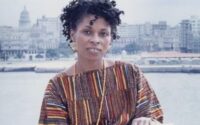Nnamdi Kanu Biography, Early Life, Career, Education, Net Worth, Age 2025
Nnamdi Kanu Biography – Nnamdi Kanu is a Nigerian-British political activist best known as the founder and leader of the Indigenous People of Biafra (IPOB), a group that seeks an independent state for the Igbo people of southeastern Nigeria. Born on September 25, 1967, in Abia State, he grew up hearing stories about the Nigerian Civil War (1967–1970) and the suffering of the Igbo people. From a young age, he believed that the Igbo were treated unfairly in Nigeria.
In 2009, he started Radio Biafra, a station that broadcast messages calling for Biafra to become its own country again. In 2014, he formed IPOB. Since then, his life has been filled with arrests, trials, exile, and strong support from many Igbo people both in Nigeria and abroad. On November 20, 2025, a Federal High Court in Abuja sentenced him to life imprisonment on seven counts of terrorism and treasonable felony. Many see him as a freedom fighter. Others view him as a threat to Nigeria’s unity. This biography explains his journey in simple, clear words.
Early Life
Nnamdi Kanu was born Nwannekaenyi Nnamdi Okwu Kanu on September 25, 1967, in Isiama Afaraukwu, Umuahia, Abia State, Nigeria. He was the first of five children. His father, HRM Eze Israel Okwu Kanu, was a traditional ruler of the Afaraukwu community. His mother was Ugoeze Nnenne Kanu.
He grew up during a difficult time for the Igbo people. The Nigerian Civil War had ended only a few years before he was born. Many families, including those around him, still remembered losing homes, loved ones, and property. Stories of hunger, war, and the failed Biafran dream shaped his childhood. These experiences later became the main reason he fought for Biafra.
Education
Nnamdi Kanu started primary school at Library Avenue Primary School in Umuahia. He later attended Government College Umuahia for his secondary education. After secondary school, he gained admission to the University of Nigeria, Nsukka (UNN) to study English Language.
Frequent strikes by university teachers (ASUU) made studying in Nigeria difficult. Because of these long strikes, he left Nigeria and moved to the United Kingdom in the early 1990s. In the UK, he completed his university education and earned a degree. Some reports say he also studied Hebrew and became interested in the idea that some Igbo people may have ancient Jewish roots.
Personal Life
Nnamdi Kanu is married to Uchechi Okwu-Kanu, a British citizen. The couple lives in the United Kingdom when he is not in detention. They have children together. Their eldest son is named Nnabuikem.
While in prison, Kanu has often spoken about his health. He says he has heart problems and needs special medical care. His wife and family members regularly visit him in the Department of State Services (DSS) detention facility in Abuja. Both his parents passed away while he was in detention. His mother died in 2019 and his father in 2020.
Kanu practices Judaism. He observes the Sabbath (Saturday rest) and celebrates Jewish holidays. He believes that the Igbo people share a historical connection with the Jewish people.
Net Worth
There is no official or verified information about Nnamdi Kanu’s personal wealth. He has never run a large business or held public office. Most of his adult life has been spent on political activism. IPOB says it receives donations from members and supporters around the world, but Kanu has repeatedly said he does not take money for personal use. Claims about him owning expensive houses or having millions of dollars remain unproven and are often spread by his opponents.
Career
Before becoming a full-time activist, Nnamdi Kanu lived a quiet life in the United Kingdom. He did different jobs to support himself.
His real career began in 2009 when he started Radio Biafra, an online radio station broadcasting from London. The station spoke directly to Igbo listeners about history, politics, and the need for Biafra to become independent again. The programs were very popular in southeastern Nigeria.
In 2014, he officially launched the Indigenous People of Biafra (IPOB). He became its leader and main voice. IPOB grew quickly and organized peaceful protests, rallies, and “sit-at-home” days to draw attention to the call for a referendum. In December 2020, IPOB created the Eastern Security Network (ESN) to protect farmers from attacks in the Southeast. The Nigerian government later labeled both IPOB and ESN as terrorist organizations.
Controversies
Nnamdi Kanu’s words and actions have caused many arguments.
Some of his strong statements on Radio Biafra were seen as hate speech or calls for violence. In 2015, he was first arrested in Lagos and charged with terrorism and criminal conspiracy. He spent almost two years in detention before getting bail in 2017.
After soldiers raided his home in Abia State in September 2017, he disappeared. The Nigerian Army said he escaped. He later appeared in Israel. In June 2021, he was brought back to Nigeria from Kenya in a way that the government called “extraordinary rendition.” Courts in Nigeria and the region later ruled that his re-arrest and return were illegal.
His trial lasted many years. Four different judges handled the case. On November 20, 2025, Justice James Omotosho found him guilty on seven out of fifteen charges and sentenced him to life in prison. Supporters say the trial was unfair. The government says he broke the law by calling for Nigeria to be divided.
Legacy
Even while in prison, Nnamdi Kanu remains the most recognized face of the new Biafran movement. Millions of young Igbo people see him as a hero who speaks truth to power. IPOB continues to grow in Nigeria and among Igbo communities in Europe, America, and Asia.
His activities brought world attention to complaints about unfair treatment of the Igbo people in Nigeria after the civil war. Many now openly discuss topics that were once considered taboo, such as restructuring the country or holding a referendum.
At the same time, the sit-at-home orders linked to IPOB have hurt businesses and schools in the Southeast. Some people blame Kanu for increased violence in the region, even though he says he wants only peaceful change.
Conclusion
Nnamdi Kanu’s life shows how one person’s strong beliefs can divide a nation. To his followers, he is a brave leader fighting for justice and freedom. To the Nigerian government and many others, he is a man whose words caused danger and disunity.
As of November 2025, he is serving a life sentence, but his supporters continue to demand his release. Whether history will remember him as a liberator or as someone who made problems worse is still being written. What is clear is that the questions he raised about fairness, identity, and self-determination will not disappear quickly.
FAQs
Who is Nnamdi Kanu?
He is the founder and leader of IPOB, a group calling for an independent Biafra.
When and where was he born?
September 25, 1967, in Isiama Afaraukwu, Umuahia, Abia State, Nigeria.
Is Nnamdi Kanu married?
Yes, he is married to Uchechi Okwu-Kanu, and they have children.
Why was Nnamdi Kanu arrested?
He was charged with terrorism, treasonable felony, and running an unlawful organization.
What is his current status as of November 2025?
He is serving a life sentence handed down on November 20, 2025.
Does Nnamdi Kanu have British citizenship?
Yes, he is a British-Nigerian dual citizen.
What religion does he practice?
He practices Judaism and observes Jewish customs.
What is IPOB?
Indigenous People of Biafra, a group he started in 2014 to push for Biafran independence through peaceful means and referendum.
Will Nnamdi Kanu be released?
His lawyers have filed an appeal. The final decision now rests with higher courts.
Where is he detained?
He is held by the Department of State Services (DSS) in Abuja.

